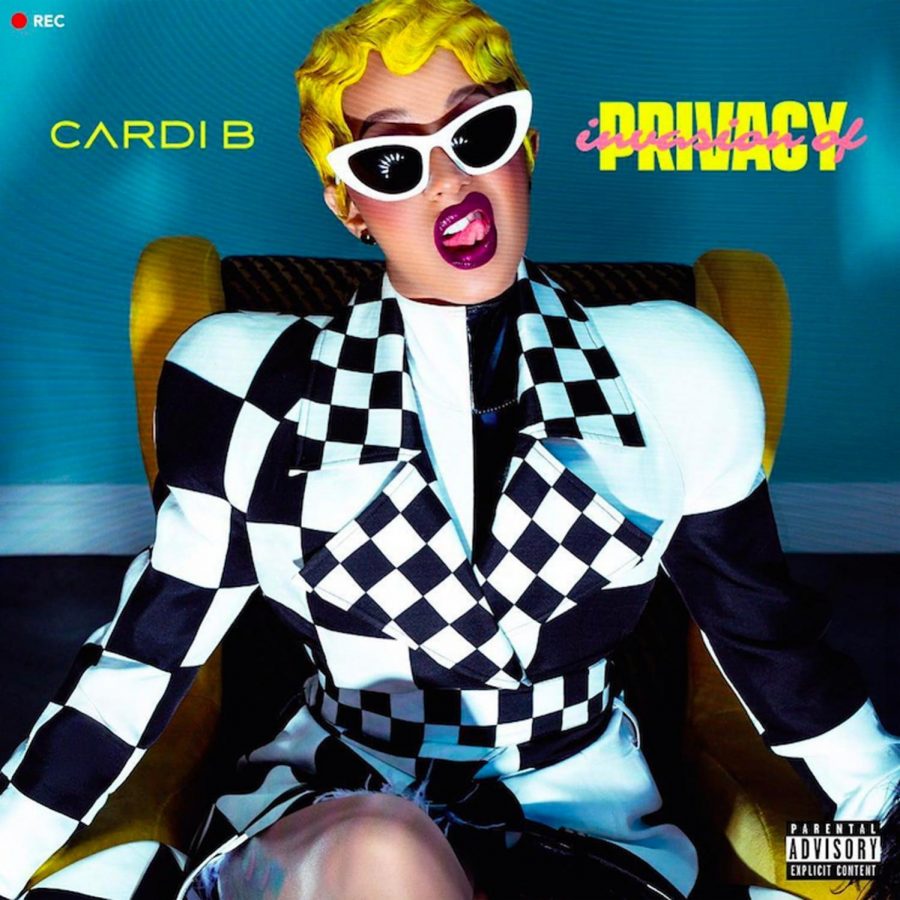Breaking hip-hop artist Cardi B. establishes herself in “Invasion of Privacy”
September 4, 2018
She was 16 when she joined the Bloods gang. Three years later, to escape poverty and domestic violence, she became a stripper. Today, Cardi B. struts a $500,000 engagement ring, and her studio debut is the most-streamed album by a female artist in its first week.
In many ways, the classic rags-to-riches story of a young, aspiring star substantiates “Invasion of Privacy.” Like all good hip-hop albums, it has authority, wit and flow, which are appropriately established in the intense three-minute verse of opening track “Get Up 10.”
“Money Bag” and “She Bad,” featuring YG, are a promise that the stellar Cardi we witnessed in 2017 (with her two outstanding singles “Bodak Yellow” and “Bartier Cardi”) is here to stay. But because only two of the album’s 13 songs continue of the style we have seen from her, they also indicate that what we saw last year is only a glimpse of everything that is Cardi. There is just so much more that we don’t know yet.
In “Bickenhead,” Cardi immediately digs out her deep roots in the Southern rap scene. She knits multiple cultural connections by interpolating the rhythm and bassline from Project Pat, Three 6 Mafia and La Chat’s 2001 track “Chickenhead” while repeating the “alright” verse from DJ Jimi’s 1992 “B*****s (Reply),” arguably one of the defining songs of New Orleans bounce music.
And just as Migos-backed “Drip” viciously warns us to not get in the way of Cardi’s success, we only come to adore her more. With the confident yet quirky Bronx native behind it, “Invasion of Privacy” surpasses the narrow-minded ‘on-the-come-up,’ ‘we-made-it’ vibe that is all too well-known in modern hip-hop culture. Instead, it carefully explores multiple musical genres and experiments with different vocal styles to discuss the ongoing highlights of her personal life.
Arguably the album’s standout song, “Be Careful” embraces a backdrop that seamlessly weaves between tropical house, trap and a jazzy bassline as Cardi carefully presses her warning against infidelity in her personal relationships.
She first shows a softer side in her desire to build a family as she reveals, “I wanna get married, like the Curry’s, Steph and Ayesha s***.” Yet she’s quick to remind us that she’s not just a pushover, and that in reality, her celebrity world is full of disloyalty: “But we more like ‘Belly’ — Tommy and Keisha s***,” referring to the shouting match-turned-love scene from Hype Williams’ 1998 cult classic of the same name.
Nevertheless, “Be Careful” is a deep breath, a tingling warmth that travels through our veins to our fingertips. We get chills as Cardi belts out a heartwarming chorus in a raw yet glossy croon: “Be careful with me, do you know what you doin’? / Whose feelings that you’re hurtin’ and bruisin’?”
Following “Be Careful,” Cardi B.’s experimentation with singing choruses and rapping verses continues on “Thru Your Phone,” “Best Life” and “I Do,” featuring, respectively, Chance The Rapper and SZA. On “Ring,” in particular, Cardi’s assertive tone is complemented beautifully by featuring artist Kehlani’s silky, angelic voice. Above a humming, velvety bassline, Kehlani’s notes form a melody on every word, leaving us with a lingering impression of the two in a dark, fading background.
Such elite backup from the R&B/soul department, combined with the genre’s distinctive suppressed melodies and rich bass and snare beats, rounds off “Invasion of Privacy” with a silky touch. A different sort of light, one that we would all gravitate towards, is shed on Cardi: if her rapping formed the bright spotlight of the concert stage, her R&B/soul renditions might be dusty, shimmering illuminations from a translucent cathedral window.
And “Invasion of Privacy” would not have its energy nor its distinction if not for “I Like It,” featuring Latino rapper Bad Bunny and reggaeton star J Balvin. Sampling Pete Rodriguez’s 1967 boogaloo song “I Like It Like That” and incorporating a Latin groove, an animated horn section and a hybrid modern-traditional percussion, the track puts an enthusiastic spin on Cardi’s Dominican/Trinidadian origins. Most memorably, in each of the eight bars of song’s chorus, a line of rap by Cardi on a hip-hop bassline perfectly transitions into a “I said I like it” sample fragment, creating an infectious tune that sticks long after the song stops playing.
Structured with a general-to-specific order of song themes and incorporating a diversity of musical genres, Cardi B. discloses to us in her debut album that there is much more to her than her drama, her social media accounts, and “Bodak Yellow.”
“My little 15 minutes lasting long as hell, huh?” (“I Do”). Yes, Cardi, we’re still listening to you.



